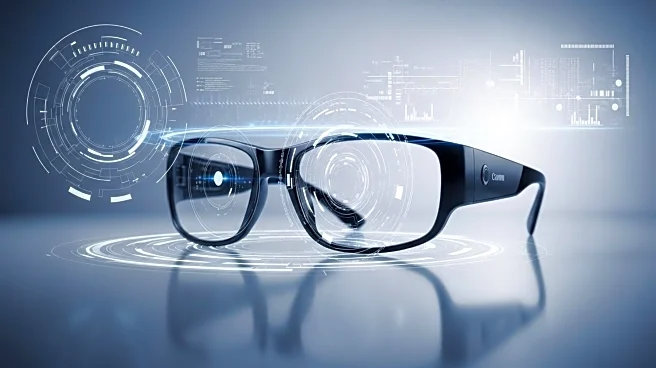What's Happening?
Smart glasses, a segment of the 'smart' technology trend, are facing significant challenges in gaining market traction. Unlike widely adopted smart devices such as smartphones and TVs, smart glasses struggle due to their bulky design and the integration of complex components like computers, cameras, and microphones. Meta's Ray-Ban Display smart glasses, featuring a 600 x 600 pixel display, a 12 MP camera, and stereo speakers, aim to offer a streamlined experience. However, they require additional accessories like a wristband, which adds complexity for users. Despite advancements, practical applications for smart glasses remain elusive, with features like real-time language translation and map navigation being easily performed on smartphones. Privacy concerns also pose a significant barrier, as the covert nature of smart glasses can lead to unauthorized recording, raising ethical and surveillance issues.
Why It's Important?
The struggle of smart glasses to find a foothold in the market highlights broader issues in the tech industry regarding consumer acceptance and privacy. While companies like Meta innovate with features that could enhance user experience, the skepticism surrounding the value proposition of smart glasses persists. Privacy concerns are particularly acute, as the ability to record without clear indicators can infringe on personal privacy, leading to potential resistance from consumers. The success or failure of smart glasses could influence future developments in wearable technology, impacting how companies approach privacy and user interface design. The market's response to these devices will likely shape the trajectory of smart technology integration into everyday life.
What's Next?
As Meta and other companies continue to develop smart glasses, they must address the privacy and practical application concerns that have hindered adoption. Future iterations may focus on reducing bulkiness and enhancing user-friendly features without compromising privacy. Companies might also explore alternative applications for smart glasses, such as mixed-reality experiences or specialized industry uses, to broaden their appeal. The ongoing debate over privacy and surveillance will likely influence regulatory discussions and consumer advocacy, potentially leading to new standards for wearable technology.
Beyond the Headlines
The ethical implications of smart glasses extend beyond privacy concerns, touching on broader societal issues such as surveillance culture and the balance between innovation and personal rights. As technology advances, the line between convenience and intrusion becomes increasingly blurred, prompting discussions about the role of technology in everyday life. The development of smart glasses may also spur innovation in related fields, such as augmented reality and artificial intelligence, as companies seek to create more integrated and less intrusive user experiences.










